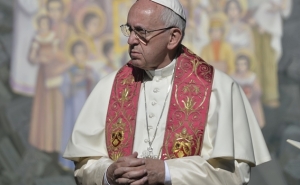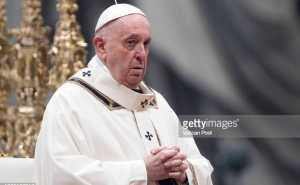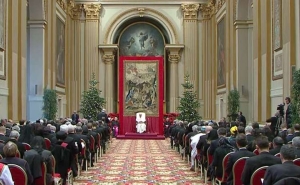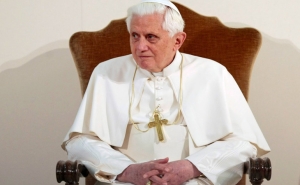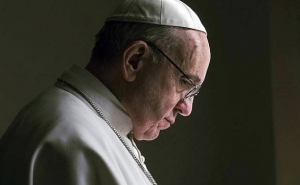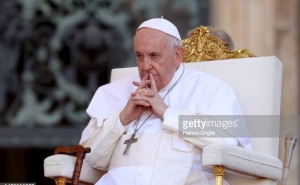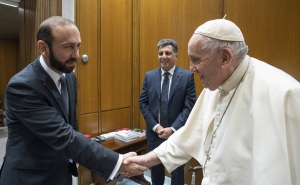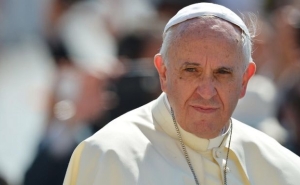Vatican May Play an Active Role in Israeli-Palestinian Reconciliation Process

The process of the recognition of the State of Palestine that gained a great momentum in the second half of 2014 and was in a halt for a certain period of time, resumed with the Joint Statement of the Bilateral Commission of the Holy See and the State of Palestine. In fact this is the first treaty that recognizes Palestine as a state, as before that the relations of Vatican with Palestine were officially called Vatican-Palestinian Liberation Organization relations.
"Both Parties agreed that the work of the Commission on the text of the Agreement has been concluded, and that the agreement will be submitted to the respective authorities for approval ahead of setting a date in the near future for the signing," – the statement says. This joint statement is based on the progress made on achieving a Comprehensive Agreement following on the Basic Agreement, signed on 15 February 2000.
The Basic Agreement, as it is written in vatican.va, calls for a special statute for Jerusalem, internationally guaranteed, which should safeguard the following:
a. Freedom of religion and conscience for all.
b. The equality before the law of the three monotheistic religions and their institutions and followers in the City.
c. The proper identity and sacred character of the City and its universally significant, religious and cultural heritage.
d. The Holy Places, the freedom of access to them and of worship in them.
e. The Regime of "Status Quo" in those Holy Places where it applies.
According to Article 4 of this agreement signed between the Holy See and the Palestinian Liberation Organization, "The regime of the "Status Quo" will be maintained and observed in those Christian Holy Places where it applies." In addition Article 5 says that "the PLO recognizes the freedom of the Catholic Church to exercise her rights to carry out, through the necessary means, her functions and traditions, such as those that are spiritual, religious, moral, charitable, educational and cultural."
These are the key points of the agreement on which a joint technical group is working to come to a Comprehensive Agreement. From the content of 2000 Agreement, it becomes obvious that Vatican has certain interests in the territory that is now controlled by the Palestinian Authorities – these interests are religious ones taking into consideration all the Christian Holy sites in that territory.
Though this is the first time that in an official document signed between Vatican and the Palestinian Authorities, instead of PLO it is written "the State of Palestine," it is not the first time that on different occasions Vatican uses this formulation. Referring to this issue, Vatican officials declared that this is not the Holy See's first recognition of the State of Palestine, Reuters reports citing a part from Vatican’s statement "We have recognized the State of Palestine ever since it was given recognition by the United Nations in 2012 and it is already listed as the State of Palestine in our official yearbook." Thus with this treaty Vatican became the 136th country to recognize the State of Palestine and the second European country after Sweden (2014). After the Swedish move, the European Parliament, as well as the British, French, Spanish and Irish Parliaments passed resolutions urging their governments to follow the suit.
Of course, the fact that a treaty between Vatican and Palestine is due to be signed could not leave Israel indifferent. The Israeli Foreign Ministry expressed its disappointment with Vatican's decision by stating: "Israel heard with disappointment the decision of the Holy See to agree a final formulation of an agreement with the Palestinians including the use of the term ‘Palestinian State’." The statement posits that this kind of development hinders the peace process and "distances the Palestinian leadership from returning to direct bilateral negotiations."
Israel's this reaction is not something strange or unexpected, as any step forward done by either conflicting sides meets this kind of or ever harsher reaction. The most interesting thing in all this process is that most likely it was not a coincidence that the shift of Vatican's diplomatic relations from PLO to the State of Palestine took place days before Abbas' visit to Vatican. On May 16, Abbas met the Pope, during which Holy See called for a resumption of Israeli-Palestinian peace talks. Pope declared that he believes with the help of the international community, as The Jerusalem Post reports, "Israelis and Palestinians may take with determination courageous decisions to promote peace." Pope Francis even gave a medal to Abbas with a figure of the angel of peace "which destroys the evil spirit of war" saying: "I thought of you because you are an angel of peace." This meeting will be followed by the canonization ceremony of two nuns who lived in Ottoman Palestine during the 19th century, becoming the first Palestinian Arabs to gain sainthood.
All these show that Vatican has started a serious process of deepening its cooperation with Palestine. This can have different reasons, but two are obvious: first, Vatican wants to promote its interests in the territory controlled by Palestine, mainly to have certain privileges and rights in the Holy places, which are of great value for Christians. Second, by increasing its role in the region, Vatican tries to help in the process of the reconciliation of Israel and Palestine, that would bring peace to the region and would secure the Holy places and monuments to be preserved. In this regard one should also not exclude that Vatican may start playing an active role in Israel-Palestine negotiation process…
Other materials on this subject
- Israeli Army Neutralizes Hamas Tunnel In Northern Gaza Strip The tunnel with two routes was dug toward Israeli territory but did not cross the newly-constructed underground sensory barrier and thus did not pose a threat to neighboring communities, the military said.
- Al Jazeera journalist shot and killed during Israeli raid in West Bank The Qatar-based network interrupted its broadcast to announce her death.
- Israel and Hamas Agree Gaza Ceasefire after 11 Days of Fighting The development came amid growing global alarm about the bloodshed, with US President Joe Biden urging Israeli Prime Minister Benjamin Netanyahu to seek de-escalation, and mediation bids by Egypt, Qatar...
- US for 3rd Time Blocking Security Council Joint Statement Calling for Ceasefire between Israel and Hamas The statement was introduced by Norway, Tunisia and China following today’s emergency session on the escalation in Israel and Gaza and criticized both sides for the ongoing violence.
- Israeli Aircraft Strike in Gaza The airstrikes came in retaliation after 13 rocket launches from the Gaza Strip into Israeli territory were identified earlier in the morning, eight of which were intercepted by the Iron Dome missile defense...
-
 17:08
17:08The regular session of the Anti-corruption Policy Council takes place in Jermuk
-
 15:05
15:05The Prime Minister sends congratulatory messages to the supreme leader of Iran and the President of Iran
-
 11:11
11:11Armenia sends earthquake aid to Turkey
-
 10:43
10:43Commemoration of the Pontiff St. Sahak Partev
-
 09:16
09:16Some roads are closed and difficult to pass in Armenia
-
 19:55
19:55Phone conversation of the Foreign Minister of Armenia with the U.S. Assistant Secretary of State for European and Eurasian Affairs
-
 18:30
18:30Prime Minister Pashinyan and President Khachaturyan meet
-
 18:20
18:20Ararat Mirzoyan with Co-Chairman of the OSCE Minsk Group of France Brice Roquefeuil
-
 17:01
17:01Humans could land on Mars within 10 years, Musk predicts
-
 16:45
16:45France, US urge 'immediate' end to Nagorno Karabakh blockade
-
 16:01
16:01Blockaded Nagorno Karabakh launches fundraiser to support quake-hit Syria
-
 15:59
15:59Earthquake death toll in Turkey rises to 18,342
-
 15:43
15:43Ararat Mirzoyan Held a Telephone Conversation with Sergey Lavrov
-
 15:06
15:06French president rules out fighter jet supplies to Ukraine in near future
-
 14:47
14:475 Day Weather Forecast in Armenia
-
 14:44
14:44President Vahagn Khachaturyan wrote a note in the book of condolences opened in the Embassy of Syria in Armenia
-
 14:20
14:20Azerbaijan’s provocations impede establishment of peace and stability – Armenian FM tells Russian Co-Chair of OSCE MG
-
 12:57
12:57France representation to OSCE: Paris calls on Azerbaijan to restore freedom of movement through Lachin corridor
-
 11:40
11:40Command of Kosovo forces highly appreciated preparation of Armenian peacekeepers
-
 10:16
10:16The United States withdrew from sanctions against Syria for six months the provision of assistance after the earthquake
day
week
month
Humidity: %
Wind: km/h


